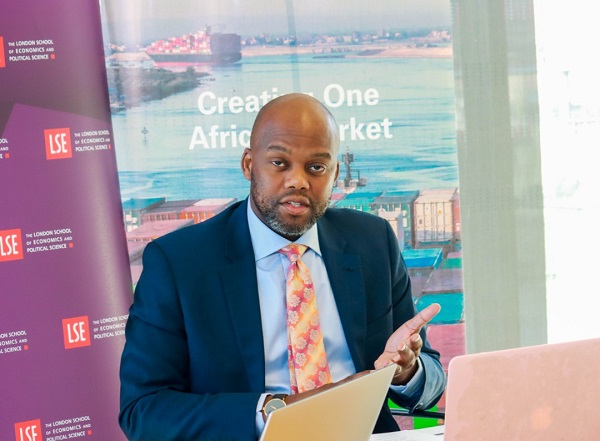
We will ensure equitable distribution of AfCFTA gains -Wamkele Mene
WITH some nations more powerful and resourced than others on the African continent, there are fears about how the gains from the implementation of the US$3trillion Africa Continental Free Trade Area (AfCFTA) agreement would be distributed.
However, in his quest to allay the fears of the less endowed countries and the people to enable them to play an active role in its implementation, the Secretary General of the Africa Continental Free Trade Area (AfCFTA), Wamkele Mene, has assured all participating African countries of an equitable distribution of the wealth.
He said the secretariat was working to ensure that that was at the centre of the implementation so no nation would be left behind.
Mr Mene gave the assurance while addressing the 8th Annual London School of Economics (LSE) Africa Summit held on the theme “African prosperity through peace, health and development”.
“If the AfCFTA is perceived to be benefiting only a handful of relatively industrialised countries in Africa, and a handful of African Multinational Corporations, it shall be rejected by Africans, and deservedly so,” he stated.
He said ensuring that no group, sector or country feels marginalised or excluded from the benefits of AfCFTA, it would help address the root causes of conflicts, give hope to the citizens and set the continent on the road towards prosperity.
Enormous challenges
The Secretary General said Africa’s development challenges were quite enormous, noting that a study by the Mo Ibrahim Foundation pointed out that two in every three Africans rely on subsistence farming for food and basic livelihoods while nearly half (600 million people) still do not have access to electricity.
With an average Gross Domestic Product (GDP) per capita of US$2,000 (compared to the global average of US$10,500) and a population set to rise from 1.3 billion to four billion in just 80 years, he said Africa’s economy needed to be 16 times bigger than it was currently in order to elevate the quality of life of its citizens to match the global average.
He said climate shocks also threatened to derail Africa’s development gains, with estimates showing that adapting to climate change could cost the continent US$50 billion yearly by 2050.
“Furthermore, losses to GDP could be in excess of 20 per cent in extreme-temperature scenarios,” he noted.
Fostering development
To foster the development of the continent, Mr Mene said Africa must use its vast natural resources to the benefit of its countries and people.
He also called for the need to strengthen intra-Africa trade and economic integration; diversify economies and industrialise; and build continental, regional and country infrastructure.
“The development we talk about must be inclusive, and must ensure people’s participation in their own development,” he said.
He said that was where the AfCFTA would come in as a game changer, presenting an opportunity to accelerate intra-African trade and use trade more effectively as an engine for growth and sustainable development.
“Through the AfCFTA, Africa is reshaping her small and fragmented markets to create one integrated market with large economies of scale and scope,” he said.
Other trade related issues
Mr Mene also pointed out that beyond the trade in goods; AfCFTA covered other trade-related issues that were critical to foreign direct investment (FDA) strategies and activities, including trade in services, competition policy, intellectual property rights, investment, dispute settlement and digital trade.
He said the finalisation of all these protocols would greatly contribute to deepening economic integration in Africa.
“With these additional protocols, we are further transforming the continent by removing physical and commercial barriers that have hitherto hindered trade among our countries.
“The continent is, therefore, poised to develop a harmonised market space which will in turn promote the development of regional value chains that will be linked competitively to global value chains,” he said.
Transforming from agric to agribusiness
The Secretary General also noted that Africa must strategically transform itself from agriculture to agribusiness; from being mere growers of cocoa beans to manufacturers of world-class chocolate products and from mining to mining beneficiation.
“Africans must of necessity participate in these sectors as investors and shareholders. As it is widely acknowledged, chocolate is a US$100-billion industry, meanwhile Ghana and Côte d'Ivoire who produce 65 per cent of the raw material make only about US$6 billion (six per cent) from the sweat and toil of their farmers.
“The retailers (44.2 per cent) and manufacturers (35.2 per cent) eat into the majority of the earnings from cocoa sales. But why is Africa not manufacturing the finished chocolate products, we may ask?
“We need to dismantle this colonial legacy of exporting primary products, our raw natural resources, if we are to achieve the aspirations of Agenda 2063,” he said.